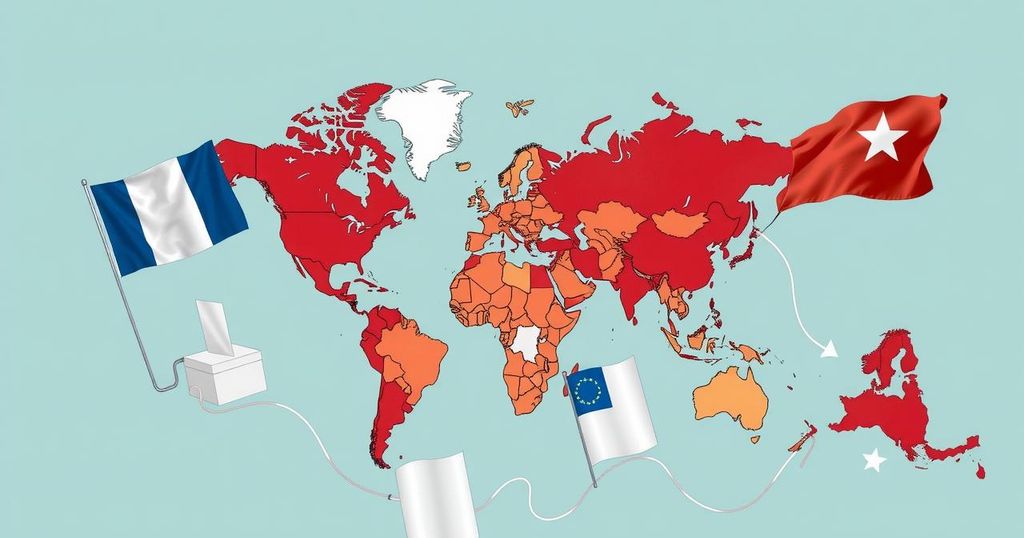In 2024, global elections revealed widespread voter dissatisfaction with incumbents, leading to significant political changes across 70 nations. Major democracies faced upheaval, with the rejection of established parties in India, the U.S., and the U.K., amidst rising economic challenges and global instability. The year marked a notable ascent for far-right parties and growing concerns about electoral integrity, leaving a precarious future for democratic ideals.
In 2024, voters worldwide delivered a striking message to their leaders: dissatisfaction with incumbent governments led to widespread electoral upheaval across 70 nations, affecting half of the global population. Countries such as India, the United States, Japan, France, and the United Kingdom witnessed significant electoral shifts as voters responded to rising economic challenges and global instability. Mass unrest manifested in multiple regions, including Mozambique and Georgia, while South Korea faced martial law following electoral turmoil. Political experts described 2024 as a year characterised by growth for far-right movements and a decline for traditional incumbents, prompting critical reflections on democracy’s health worldwide.
The pervasive anti-incumbent sentiment was identified as an outcome of prolonged dissatisfaction stemming from “electoral long COVID,” a term denoting the lasting socio-economic effects of the pandemic. As inflation skyrocketed, accentuated by geopolitical strife, millions found themselves in increasingly precarious situations. In South Africa, the ANC’s three-decade rule crumbled as the electorate favored coalition governance, reflecting a broader trend observed in Senegal and Ghana, where established powers were ejected from office. Additionally, notable losses for governments occurred in Japan, India, and the United Kingdom, each underscoring growing public demand for new leadership amid discontent.
While the left faced setbacks, the rise of populist and far-right parties became prominent across Europe, notably in France and Germany. These elections highlighted a complex landscape of political fragmentation, where traditional parties lost ground, allowing for less conventional political configurations. Additionally, allegations of external interference and digital disinformation campaigns marred several electoral processes, raising alarm over the integrity of democratic systems.
As 2024 concluded, the international community looked to the future with trepidation, particularly concerning the implications of Donald Trump’s return to the presidency in the United States. The backdrop of ongoing crises in various nations, such as Venezuela and Mozambique, suggests a persistent instability that could challenge democratic norms further afield. Leading political analysts recognise an underlying desire for democracy among citizens, yet acknowledge a stark gap in satisfaction with its practical applications, indicating a potential future rife with electoral disruption.
The global political landscape in 2024 has been marked by significant electoral changes, reflecting a widespread discontent with incumbent administrations. This discontent is rooted in various factors including economic struggles and global crises like the COVID-19 pandemic and the ongoing impacts of armed conflicts and geopolitical tensions. Notably, the rise of populism and extremist ideologies within democratic contexts elucidates the complexities and challenges facing contemporary governance. Events such as mass protests and allegations of electoral fraud have further underscored tensions between governing bodies and the electorate, raising important questions about the future of democracy.
The tumultuous electoral landscape of 2024 underscores a disillusionment with traditional political structures, prompting citizens worldwide to seek alternatives in governance. As incumbents in multiple regions faced the consequences of public dissatisfaction, the emergence of right-wing populism and challenges to democracy highlight the fragility of established political systems. With significant events shaping the future trajectory of global elections, the call for accountability and responsive governance remains paramount as citizens grapple with the efficacy of democracy in addressing their needs.
Original Source: www.clickondetroit.com






